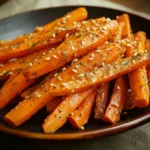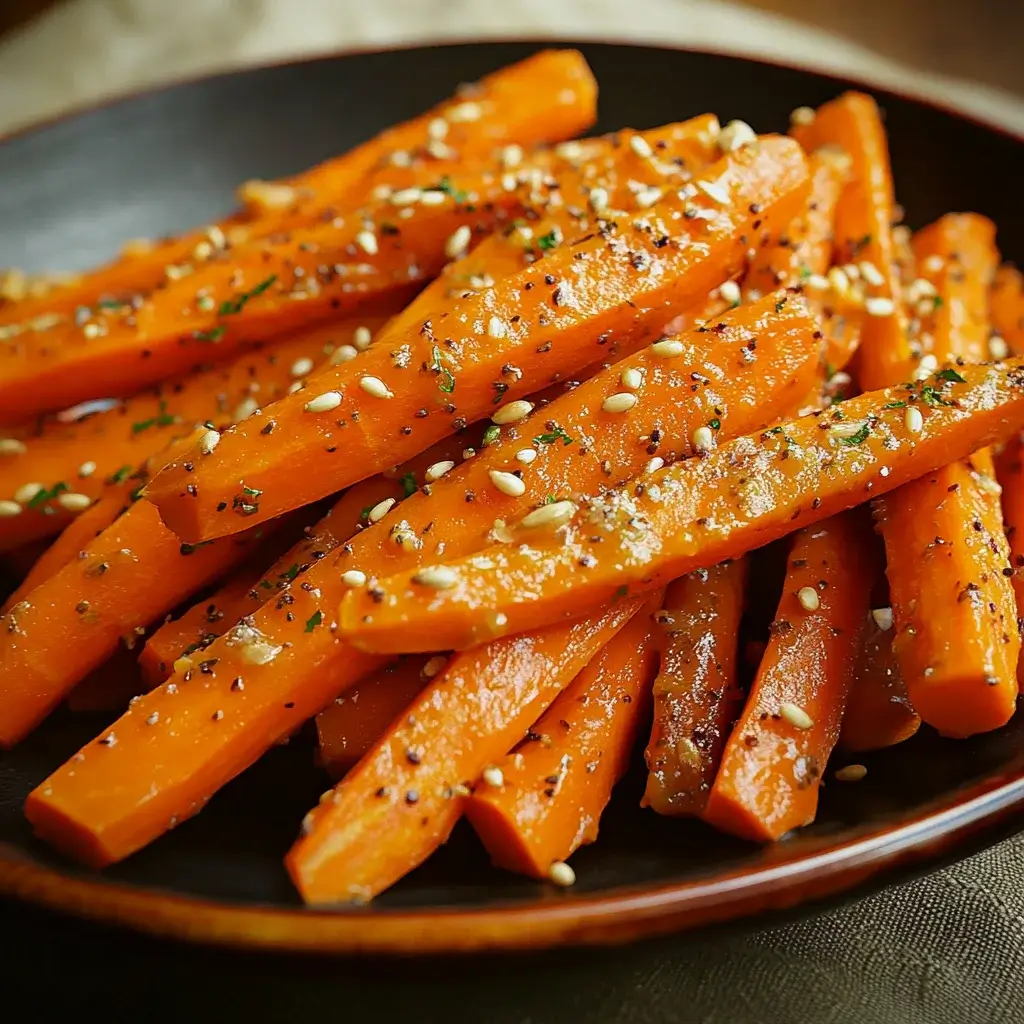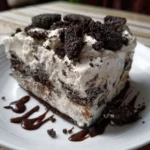Finding that perfect snack often feels like searching for a unicorn – especially when you need something healthy, quick, easy, and appealing to picky eaters. My own household used to cycle through the same few options, often leaving me feeling uninspired and my kids occasionally bored. Then, one busy afternoon, desperate for a simple energy boost that wasn’t loaded with sugar or common allergens, I grabbed a bag of carrots and a jar of sunflower seed butter. It seemed almost too simple. But the combination? Revelation! The sweet, earthy crunch of the carrot paired perfectly with the rich, slightly savory creaminess of the sunbutter. My kids, initially skeptical (“Just carrots?”), devoured them. It became an instant staple – our go-to after-school fuel, a reliable lunchbox addition, and even a surprisingly satisfying late-night munchie for me. It’s proof that sometimes, the simplest combinations are the most effective, delivering big on taste, texture, and nutritional benefits without any fuss. This recipe, if you can even call something so straightforward a recipe, is a testament to the power of whole foods and uncomplicated pairings.
Ingredients
- 4 Medium-Large Carrots (approx. 300-350g): Choose firm, bright orange carrots. Fresher carrots offer a superior crunch and natural sweetness, which contrasts beautifully with the seed butter. Organic options are great if available.
- 1/4 cup (approx. 64g) Sunflower Seed Butter: Opt for a natural variety, preferably unsweetened or lightly sweetened, with minimal added oils or sugars. Creamy or crunchy texture works – it’s purely personal preference. Check the label for just sunflower seeds and perhaps salt.
Instructions
- Prepare the Carrots: Wash the carrots thoroughly under cold running water, scrubbing gently with a vegetable brush to remove any dirt or residue. Pat them dry with a clean kitchen towel or paper towels.
- Peel (Optional): Decide whether to peel the carrots. Peeling results in a slightly smoother texture and removes any potential bitterness from the skin, which some people prefer. However, the skin contains fiber and nutrients, so leaving it on (after a good wash) is perfectly acceptable and adds nutritional value. If not peeling, you may want to trim off the very top (stem end) and the thin tip.
- Cut the Carrots: Trim off the ends of the carrots. Cut the carrots into uniform sticks, roughly 3-4 inches long and about 1/2 inch thick. Aim for consistency in size so they are easy to handle and dip. You can cut them crosswise into halves or thirds first, then slice each section lengthwise into sticks. Alternatively, for variety or younger children, consider cutting them into rounds (coins) or using a crinkle cutter for fun shapes.
- Portion the Sunflower Seed Butter: Spoon the 1/4 cup of sunflower seed butter into a small bowl or ramekin. If the oil has separated in the jar (common with natural varieties), stir it thoroughly before measuring to ensure a smooth, consistent texture.
- Serve: Arrange the carrot sticks on a plate or pack them into a container alongside the bowl of sunflower seed butter. Dip the carrot sticks into the sunflower seed butter and enjoy immediately.
Nutrition Facts
- Servings: Approximately 2 servings
- Calories per serving: Approximately 230-280 kcal (This can vary based on the exact size of the carrots and the specific brand/type of sunflower seed butter used, especially regarding added sugars or oils).
Key Nutritional Highlights (Estimates per serving):
- Vitamin A (from Carrots): Carrots are packed with beta-carotene, which the body converts into Vitamin A. This serving provides a significant portion of the daily recommended intake. Why it matters: Vitamin A is crucial for maintaining good vision (especially in low light), supporting a healthy immune system, promoting cell growth, and keeping skin healthy.
- Vitamin E (from Sunflower Seeds): Sunflower seed butter is an excellent source of Vitamin E, a powerful fat-soluble antioxidant. Why it matters: Vitamin E helps protect your cells from damage caused by free radicals, supports immune function, and plays a role in skin health and preventing chronic diseases.
- Magnesium (from Sunflower Seeds): Sunflower seeds contribute a good amount of magnesium. Why it matters: Magnesium is involved in over 300 enzymatic reactions in the body, including energy production, muscle and nerve function, blood sugar control, blood pressure regulation, and building strong bones.
- Dietary Fiber (from Carrots & Sunflower Seeds): Both ingredients provide dietary fiber. Why it matters: Fiber aids digestion, helps maintain bowel regularity, contributes to feelings of fullness (which can help with weight management), and can help regulate blood sugar and cholesterol levels.
- Healthy Fats (from Sunflower Seeds): Sunflower seed butter is rich in unsaturated fats, primarily polyunsaturated and monounsaturated fats. Why it matters: These fats are considered heart-healthy. They can help reduce bad cholesterol levels (LDL) and support overall cardiovascular health when consumed as part of a balanced diet.
Preparation Time
- Total Time: 5 – 10 minutes
- Description: This snack is incredibly quick to prepare. The majority of the time is spent washing, potentially peeling, and cutting the carrots. Measuring the sunflower seed butter takes only seconds. There is no cooking involved, making it an ideal choice for a fast, healthy snack when time is short. If using pre-cut baby carrots, the preparation time reduces to merely opening the bag and portioning the butter – under 2 minutes!
How to Serve
This simple snack is versatile. Here are several ways to serve and enjoy Carrot Sticks with Sunflower Seed Butter:
- The Classic Snack Plate: Simply arrange the carrot sticks artfully on a small plate with a ramekin of sunflower seed butter in the center or alongside. Perfect for an individual snack break.
- Lunchbox Hero: Pack carrot sticks in one compartment of a bento box or container, and put the sunflower seed butter in a small, separate leak-proof container to prevent sogginess. It’s a fantastic nut-free school lunch component.
- After-School Fuel: Have a plate ready when the kids come home from school. It’s a nutritious way to tide them over until dinner without resorting to sugary or processed snacks.
- Party Appetizer Platter: Arrange carrot sticks (perhaps alongside other veggies like cucumber, bell peppers, or celery) radiating outwards from a central bowl of sunflower seed butter on a larger platter. It’s a healthy, colorful, and allergy-friendly addition to any party spread.
- Dip Variations:
- Stir a tiny pinch of sea salt into the sunflower seed butter to enhance the flavor contrast.
- Mix in a small dash of cinnamon for a warm, spiced version.
- Add a drizzle of honey or maple syrup (use sparingly) to the butter for extra sweetness, if desired.
- Stir in a little unsweetened cocoa powder for a “chocolatey” twist.
- On-the-Go Snack Pack: Place carrot sticks in a reusable zip-top bag or container and portion sunflower seed butter into a small travel container. Easy to take to work, the gym, or on errands.
- Part of a “Snack Board”: Include this duo as part of a larger, balanced snack board featuring other elements like cheese cubes (if not dairy-free), whole-grain crackers, fruit slices, olives, or hard-boiled eggs.
- Pre or Post-Workout: The combination of carbohydrates from carrots (for energy) and protein/healthy fats from the sunflower seed butter (for satiety and muscle support) makes it a decent option before or after exercise.
Additional Tips
- Choose Quality Ingredients: The simplicity of this snack means the quality of your two ingredients really shines through. Select fresh, firm, vibrant carrots for the best crunch and sweetness. Taste different brands of sunflower seed butter to find one you love – look for minimal ingredients (just seeds, maybe salt) and avoid those with lots of added sugar or hydrogenated oils.
- Uniform Cutting for Even Dipping: Try to cut the carrot sticks relatively uniform in size and thickness. This not only looks more appealing but also ensures a consistent dipping experience – sticks that are too thin might break, while overly thick ones might not pick up enough butter.
- Experiment with Carrot Shapes: Don’t limit yourself to sticks! Try cutting carrots into coins (rounds), crinkle-cut chips using a special blade, or even shredding carrots and mixing them into the sunflower seed butter for a slaw-like consistency spreadable on crackers. Baby carrots are also a great time-saving option.
- Make Your Own Sunflower Seed Butter: For ultimate control over ingredients and freshness, consider making your own sunflower seed butter. Simply roast raw, shelled sunflower seeds until fragrant, then process them in a high-powered food processor or blender until smooth and creamy. You can add a pinch of salt or a touch of sweetener if desired.
- Storage Savvy: Cut carrot sticks can be stored in an airtight container filled with cold water in the refrigerator for several days – this keeps them crisp. Drain them well before serving. Store opened sunflower seed butter according to the jar’s instructions, usually in the refrigerator after opening, especially for natural varieties, to prevent oil separation and maintain freshness.
- Enhance the Flavor Profile: While delicious on its own, don’t hesitate to customize. Add a pinch of flaky sea salt directly onto the sunflower seed butter just before serving. A tiny sprinkle of smoked paprika, cumin, or even everything bagel seasoning on the butter can add an unexpected savory kick.
- Involve the Kids: This is a perfect recipe for getting children involved in the kitchen. Younger kids can help wash the carrots (with supervision) or stir the sunflower seed butter. Older kids can practice their knife skills (with appropriate supervision and safety instructions) by cutting the carrots into sticks or coins. Involvement often increases their willingness to try the food.
- Mindful Portioning: While healthy, sunflower seed butter is calorie-dense due to its fat content. Be mindful of portion sizes, especially if managing calorie intake. The suggested 1/4 cup serving provides a good balance of nutrients and satiety without being excessive. Use a measuring cup initially to get a feel for the appropriate amount.
Frequently Asked Questions (FAQ)
1. Is this snack actually healthy?
Yes, Carrot Sticks with Sunflower Seed Butter is generally considered a very healthy snack. Carrots provide essential vitamins (like Vitamin A), fiber, and antioxidants. Sunflower seed butter offers healthy unsaturated fats, plant-based protein, Vitamin E, magnesium, and more fiber. It’s a balanced snack providing carbohydrates for energy, fats for satiety, and various micronutrients crucial for overall health. It’s far superior to most processed snacks, cookies, or chips.
2. Can I use other vegetables instead of carrots?
Absolutely! While carrots are a classic pairing, sunflower seed butter is delicious with many other vegetables. Try it with:
- Celery sticks
- Bell pepper strips (red, yellow, orange)
- Cucumber slices or spears
- Sugar snap peas
- Broccoli or cauliflower florets (raw or lightly steamed)
- Jicama sticks
- Radish slices
3. How does sunflower seed butter compare to peanut butter?
Nutritionally, they are quite similar, both offering healthy fats, protein, and various vitamins and minerals. Sunflower seed butter generally has slightly more Vitamin E and magnesium, while peanut butter might have slightly more protein depending on the brand. The main advantage of sunflower seed butter is that it’s a great alternative for those with peanut or tree nut allergies, making it a safe option for many schools and homes. The taste is different – sunflower seed butter has a distinct, earthy, seed-like flavor compared to the specific taste of peanuts.
4. Is this snack suitable for weight loss?
It can be, when consumed in moderation as part of a balanced diet. The fiber from both carrots and sunflower seeds, along with the protein and healthy fats in the butter, contribute to satiety, helping you feel full and potentially reducing overall calorie intake. However, sunflower seed butter is calorie-dense. Stick to the recommended serving size (around 2 tablespoons or 1/4 cup for a larger snack) to keep calories in check. The key is portion control.
5. How long will cut carrot sticks last?
When stored properly, cut carrot sticks can stay fresh and crisp for quite a while. The best method is to place them in an airtight container completely submerged in cold water and store them in the refrigerator. Stored this way, they can last for up to a week or even slightly longer, though they are crunchiest within the first few days. Remember to change the water every couple of days for optimal freshness and drain well before serving.
6. Can I make this snack ahead of time for meal prep?
Yes, this snack is excellent for meal prepping. Cut your carrot sticks and store them in water in the fridge as described above. You can also pre-portion the sunflower seed butter into small, individual containers with lids. Then, when you need a quick snack, just grab a portion of carrots (drain them!) and a container of sunbutter. This is perfect for packing lunches or ensuring healthy snacks are readily available throughout the week.
7. Is Carrot Sticks with Sunflower Seed Butter allergy-friendly?
This snack is naturally free from several common allergens:
- Nut-free: Sunflower seeds are seeds, not nuts, making this a safe alternative for those with peanut and tree nut allergies (always check labels to ensure no cross-contamination during processing if allergies are severe).
- Gluten-free: Both carrots and pure sunflower seed butter are naturally gluten-free.
- Dairy-free: Contains no milk products.
- Soy-free: Typically free from soy, but check sunflower seed butter labels as some brands might use soy lecithin (though less common in natural varieties).
- Vegan: Entirely plant-based.
However, some individuals might have a rare allergy to sunflower seeds themselves.
8. Is this snack suitable for toddlers or babies?
It can be adapted, but caution is needed. Whole carrot sticks can be a choking hazard for very young children. For toddlers (usually over 18-24 months, depending on chewing ability), ensure sticks are cut appropriately thin or offer shredded carrots or very thin carrot coins instead. Thick globs of sunflower seed butter can also be a choking hazard for babies and toddlers. Always spread it thinly on a cracker or piece of toast rather than offering it by the spoonful or as a thick dip initially. For babies starting solids (around 6 months), you could offer steamed and mashed carrots, and introduce smooth sunflower seed butter spread very thinly on another food item, always monitoring for allergic reactions and ensuring age-appropriate textures. Consult your pediatrician regarding introducing new foods and potential allergens.

Carrot Sticks with Sunflower Seed Butter
Ingredients
- 4 Medium-Large Carrots (approx. 300-350g): Choose firm, bright orange carrots. Fresher carrots offer a superior crunch and natural sweetness, which contrasts beautifully with the seed butter. Organic options are great if available.
- 1/4 cup (approx. 64g) Sunflower Seed Butter: Opt for a natural variety, preferably unsweetened or lightly sweetened, with minimal added oils or sugars. Creamy or crunchy texture works – it’s purely personal preference. Check the label for just sunflower seeds and perhaps salt.
Instructions
- Prepare the Carrots: Wash the carrots thoroughly under cold running water, scrubbing gently with a vegetable brush to remove any dirt or residue. Pat them dry with a clean kitchen towel or paper towels.
- Peel (Optional): Decide whether to peel the carrots. Peeling results in a slightly smoother texture and removes any potential bitterness from the skin, which some people prefer. However, the skin contains fiber and nutrients, so leaving it on (after a good wash) is perfectly acceptable and adds nutritional value. If not peeling, you may want to trim off the very top (stem end) and the thin tip.
- Cut the Carrots: Trim off the ends of the carrots. Cut the carrots into uniform sticks, roughly 3-4 inches long and about 1/2 inch thick. Aim for consistency in size so they are easy to handle and dip. You can cut them crosswise into halves or thirds first, then slice each section lengthwise into sticks. Alternatively, for variety or younger children, consider cutting them into rounds (coins) or using a crinkle cutter for fun shapes.
- Portion the Sunflower Seed Butter: Spoon the 1/4 cup of sunflower seed butter into a small bowl or ramekin. If the oil has separated in the jar (common with natural varieties), stir it thoroughly before measuring to ensure a smooth, consistent texture.
- Serve: Arrange the carrot sticks on a plate or pack them into a container alongside the bowl of sunflower seed butter. Dip the carrot sticks into the sunflower seed butter and enjoy immediately.
Nutrition
- Serving Size: one normal portion
- Calories: 280






